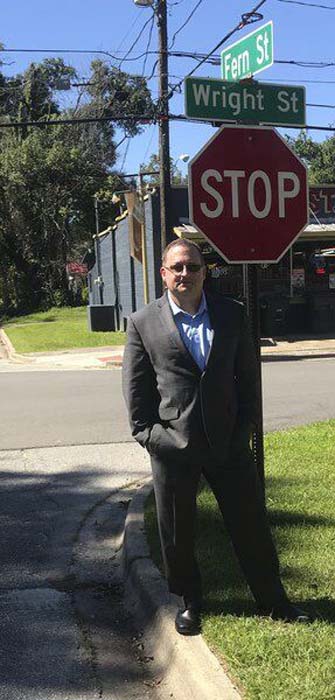From the streets to the chief — Rich recalls 30 years on the job at TPD
Published 11:40 am Friday, October 9, 2020

- Patti Dozier/Times-EnterpriseTroy Rich visits an area he described as "the heartbeat of the city." The intersection is where a drive-by farewell parade took place on the former chief's last day on the job.
THOMASVILLE — Troy Rich is returning home to New Jersey. Leaving Georgia’s Rose City in deep South Georgia, he will put down roots in a town 40 miles from New York City and 10 miles from the Jersey Shore.
Nearing the 30-year mark with Thomasville Police Department, Rich made the decision last year to return to where he spent his childhood.
Retirement day came Oct. 5, when Rich stepped down as a three-decade TPD officer — the last six as chief. He plans to leave Thomasville behind in late October.
In 1990, Rich came to Thomasville at the suggestion of Chris Mullins, his best childhood friend and a TPD officer.
Rich looked up to an uncle who was a New York City police officer. The young boy wanted to emulate his uncle with a career as a cop.
“I was always told I was too short to be a cop,” the 5-foot-6 former chief said. “Obviously, that discrimination went away.”
Born in the New York City borough of The Bronx in 1966, Rich said the area where he grew up in nearby New Jersey probably was more segregated than the South.
“Everybody had their own little town based on ethnicity and religion — Irish, Italian, Polish, Puerto Rican, African American,” he said.
Rich played high school football. Team members knew when they were playing a school with a student body of “rich kids, poor kids, Catholic or all-Black.” One county in an area of “one town after another” might have 30 high schools.
The racial divide is bigger in the South because of the region’s history, Rich said, noting Jim Crow laws that legalized segregation and civil rights battles on streets of American cities.
“Everything started coming together for me as a law enforcement professional,” Rich said, recalling his early days as a Thomasville police officer.
Patting his badge, he said, “The institution of policing bears the burden of trust between police and the African American community. We have to acknowledge that.”
Law enforcement officers must be educated to understand and empathize with trust issues in the African American community, Rich said.
Shortly after Rich became chief, a Black man died at the hands of a Ferguson, Missouri, police officer.
Thomasville had to prepare for “our Ferguson,” which Rich said occurred in August 2017, when a drug agent fatally shot an unarmed African American man on Magnolia Street.
Rich was criticized by some for how he handled the aftermath of the shooting. He said he tried to bridge the gap between police and the African American community, including out-of-town protestors, who infiltrated the city during days immediately after the shooting.
“Being ostracized, criticized and mocked by the other law enforcement entities for allowing the African American community to grieve after the death of a community member was my most disappointing experience as chief of police,” Rich said. “I was attacked because the African American community was allowed to exercise the First Amendment right to protect peacefully and march on the ‘downtown bricks.’ My counterparts wanted to clear the streets and sidewalks to prevent these marches from ever happening.”
The community — “from all sides of the tracks” — rallied around the police department and praised the agency’s decision-making and tactics from maintaining calmness and preventing lawlessness during a difficult time, the retired chief recalled.
Most of today’s law enforcement officers were not alive during civil rights battles of the 1950s and ’60s, Rich said, and they must acknowledge the harm done and understand why racial tension is so deep against the institution of law enforcement.
Today, Rich said, police chiefs are planning. “Every police department is one incident away from a Minneapolis,” he said.
Noting that 3% of the U.S. population will violate the law, Rich said, “Once you’re handcuffed, all force must stop.
“There are the lawful and the uncaught. Three percent of the population gets caught.”
American police chiefs also are retiring and resigning in droves, Rich said.
“The worst phone call a police can receive is the 2 a.m. call, because a chief is always concerned about his officers,” Rich said.
His ultimate achievement as chief is that he never received the call.
“Not one Thomasville police officer was shot or killed in the line of duty while I was chief,” Rich said.
The former chief said he could have remained in the chief position as long as he wanted to, but he and wife, Trish, prayed about where their path was leading.
They agreed in 2019 that the approaching 30-year milestone in Rich’s career was the time to retire and return home to the New Jersey area where they both grew up.
Many factors contributed to their decision.
“One of the important things we took into consideration was my health. I want to take care of my health and remove the stressors of my job,” Rich said a few days before his retirement.
“I’m sure there will be some opportunities to come up for me,” he said. “I would like to get into police consulting.”
Rich believes God wants him to leave Thomasville and go somewhere that needs help.
He is grateful for TPD officers’ and the community’s support during his time of service.
“I’m going out with my integrity,” he said.
The retired chief leaves in his wake the TPD slogan: “Slow down; we have plenty of time to die.”
Senior reporter Patti Dozier can be reached at (229) 226-2400, ext. 1820





